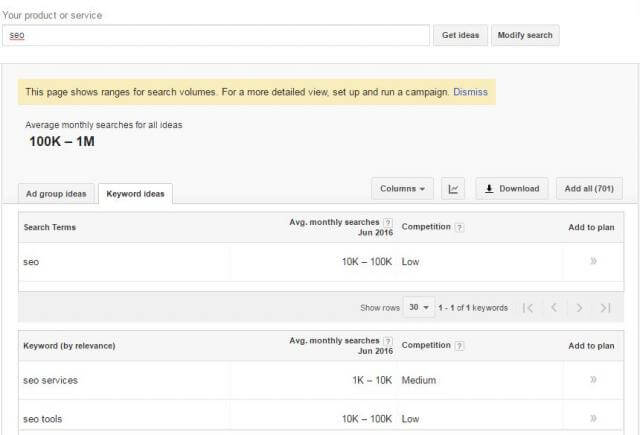As if SEO wasn’t challenging enough already, as of August 2016, Google has opted to restrict search volume data in their Keyword Planner after making this announcement:
Advertisers with lower monthly spend may see a limited data view in the Keyword Planner. For example, you may see values such as 0, 1-100, 100-1K, 1K-10K, 10K-100K, 100K-1M, 1M+ in the average monthly searches column. In addition, other advertisers may trigger the limited data view by reaching a limit on the number of searches for search volume data.
You can see that illustrated here from this graphic by Search Engine Land:

Proving my theory once again that SEO is the enemy to Pay Per Click due to the simple fact that the more successful an SEO effort is, the less likely a business is to spend money on pay per click advertising, Google’s bread and butter.
NEW KEYWORD RESEARCH TOOL SAVES THE DAY
So what’s an SEO researcher to do?
Well, help seems to be on the way with two new Cool Tools from the fine folks at StoryBase.
One is called, simply enough, the Free Keyword Search Volume Tool, which you can find HERE.
Here’s a brief video overview of how it works:
The other new Cool Tool is the Free Search Demographics Tool found HERE. Check it out.
But for the purposes of this post we’ll stay focused on the Free Keyword Search Volume Tool.
WHY IS SEARCH VOLUME IMPORTANT?
Calculating the search volume for specific keywords is an important part of the SEO equation since it’s one of the factors to consider when selecting keywords as the foundation of any SEO program. In simple terms: you want to target a certain amount of keywords that have high search volume, meaning lots of people are actively searching for those terms. If a phrase has no measurable search volume that means hardly anyone is searching for that phrase, so why bother? Without explaining all the gory details of SEO, ideally you want a mix of keywords with high search volume (which usually means greater competition as well) and long tail keywords (lesser searched but probably even more relevant keyword phrases – 3 words or more – since they are so specific).
But making those decisions had recently become more difficult since Google has opted to hide the data within Adwords accounts if you weren’t actually spending money on PPC.
So I get it. It’s Google’s game and Google’s ball and they can do with their SEO tools whatever they want. They are not in business or under any obligation to help anyone, especially SEO practitioners, for free.
So thankfully, at least for now, there are ways around depending solely on Google Adwords data to research keywords.
Hope you found this useful. What SEO challenges are you having?


